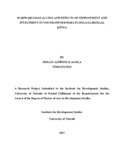| dc.description.abstract | This research project sought to explore effects of access to M-Shwari loan on youth-owned micro and small enterprises in Ongata-Rongai, Kenya by establishing the characteristics of youth-owned MSEs using M-Shwari loans, the nature of M-Shwari loans accessed, immediate use of M-Shwari loans by youth-owned MSEs and establishing the relationship between M-Shwari loan access, employment and investments in youth owned MSEs. This study was framed on the theory of finance and development and guided by financial inclusion from capability approach model. The study employed mixed method design employing both qualitative and quantitative research. The qualitative method involved the use of interview guides administered to both key informants and selected youth-owned MSEs for case studies. The quantitative technique involved administering questionnaires to randomly sampled youth-owned MSEs in the study area. A total of 53 youth-owned MSEs drawn from a population of 283 youth-owned MSEs were interviewed. The finding of this study shows that a majority of owners of youth-owned MSEs have completed secondary school and have stalls selling vegetables and fruits. Youth-owned MSEs got into business with the motive of self-employment and livelihood sources. Casual jobs and short term contracts are important sources of start-up capital for the youth-owned MSEs. M-Shwari loan is the most utilised mobile platform loan by the youth-owned MSEs. Categories of youth-owned MSEs utilizing M-Shwari loans are regular monthly borrowers who are the majority, weekly borrowers, one time borrowers, periodic borrowers, proxy borrowers, those who borrow loans from more than one mobile platform and defaulters. Access to M-Shwari loan plays a critical role in easing consumption, meeting the basic needs, adding business stock and smoothing cash flow in youth-owned MSEs .On employment, M-Shwari loan facilitated a few youth-owned MSEs in providing employment opportunities while on investments, a majority of youth-owned MSEs believe that M-Shwari loans facilitate investments. However, the relationship between access to M-Shwari loan and investment yielded a Cramer’s V of .363 with a contingency coefficient of .341 and a Pearson’s Chi-square of .509 showing no relationship. Overall, M-Shwari loans are important to the youth-owned MSEs for their investments, achieving personal goals, improving their well-being, enhancing livelihood streams, in addition to financially including the entrepreneurs and enabling their development of financial capabilities through financial empowerment. | en_US |



